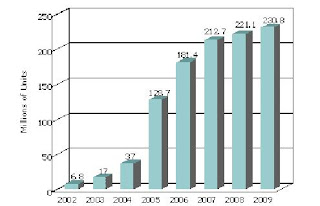 We assume iSuppli is not far off the mark in publishing this forecast of MP3 player shipments. And since the Recording Industry of America seems intent on declaring war on sideloading of music, one assumes the goal is to take control of the revenue model for MP3 downloading, forcing users to pay for downloads rather than sideload.
We assume iSuppli is not far off the mark in publishing this forecast of MP3 player shipments. And since the Recording Industry of America seems intent on declaring war on sideloading of music, one assumes the goal is to take control of the revenue model for MP3 downloading, forcing users to pay for downloads rather than sideload.While acknowledging that there are copyright issues involved, there also are technologial issues. Precisely to avoid its use as a mass copying device, every Apple iPod, for example, allows linking to each iPod to just one PC and its hard drive. Which is fine if one's hard drive or CPU or input devices never fail. If a user's PC does become unusable, any iPods linked to that PC now have a problem. They no longer can sync. Which means the devices are permanently loaded with exactly what is already on them, or must be erased and synced to whatever new PC a user designates.
That means reloading all of the original collection of music.
Alternatively, if one loses the use of the MP3 on which purchased downloaded music has been loaded, there might be no legal way to move the music to an alternate MP3 player when the original MP3 player itself dies.
Both of these sorts of technical issues must be confronted by MP3 music users. In essence, the Recording Industry of America argues one should be able to buy a music CD, but only be able to play it on one device: a home audio system but not on one's vehicle audio system, for example.
There are copyright issues here, to be sure. But there also are major end user technology issues dealing directly with personal use of legally-obtained music. And the ability to copy is essential is a "purchase" is to be anything other than a "rental." In other words, if a user "buys" a song, but then cannot transfer the song to another playback device when the original hard drive dies, is that really "ownership" or simply a "lease of unspecified but limited duration."?

No comments:
Post a Comment